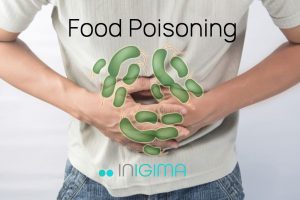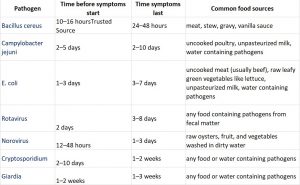Food Poisoning: Symptoms & Causes

The most common cause of gastroenteritis, which has a well-known set of unpleasant symptoms, is food poisoning. Although gastroenteritis typically goes away without treatment, problems might occasionally arise.
Inflammation of the gut lining, specifically that of the stomach and intestines, is a symptom of gastroenteritis. Pathogens that infect a person and induce symptoms typically cause it. Often, these are parasites, bacteria, or viruses. Food poisoning is the medical term used when food is the source of such an ailment.
Other names for gastroenteritis include “gastric flu” and “stomach flu.” Usually, diarrhea, nausea, vomiting, and stomach discomfort are the most typical symptoms. Dehydration can also result from it, especially in weaker individuals like the very young and the very old.
Foodborne illness signs
After consuming food contaminated with a virus, symptoms of gastroenteritis may appear within a few hours, but depending on the organism, the incubation period may last considerably longer.
Often seen are four well-known, traditional symptoms:
Diarrhea (Loose Stools)
Nausea (Feeling Sick Or Queasy)
Vomiting
Abdominal Pain (Stomach Cramps)
Any combination of these symptoms may show up. The severity of the symptoms as well as their typical abrupt (acute) onset can differ.
Vomiting typically occurs earlier in the course of the illness, and diarrhea typically lasts a few days, however it might last longer depending on the organism producing the symptoms.
In addition to the aforementioned classic signs and symptoms, gastroenteritis can cause:
Loss of appetite
Fever or high temperature and chills
Causes of food poisoning
Those who transfer a pathogen by handling food can become infected, especially in situations when maintaining good hand hygiene is more difficult. Typically, there are parasites, germs, or viruses.
Gastroenteritis virus
Another name for viral gastroenteritis is stomach flu.
The viruses most frequently responsible for viral gastroenteritis are:
Rotavirus. Viral gastroenteritis is more prevalent in children and is also its most common cause in children.
Norovirus. prevalent among adults.
Adenoviruses and astroviruses, which typically affect children and the elderly, are less frequent viral culprits. Cytomegalovirus can lead to gastroenteritis, particularly in those with weakened immune systems.
Bacterial gastroenteritis
The organisms most frequently responsible for bacterial gastroenteritis are:
Salmonella
Campylobacter
Shigella
Escherichia coli (especially serotype O157:H7)
Clostridium difficile
According to a report by the Interagency Food Safety Analytics Collaboration of the U.S. Centers for Disease Control and Prevention (CDC), beef and leafy green vegetables were the source of 75% of E. coli illnesses between 2015 and 2019.
Parasitic gastroenteritis
In order to thrive, parasitic creatures depend on other living things for food.
Despite the fact that parasitic illnesses do occur worldwide, low- and middle-income areas are more likely to get parasitic gastroenteritis. Every year, over 450 million individuals throughout the world get sick.
The two forms of parasites that commonly affect the human gastrointestinal tract are helminths, which are worm parasites, and single-celled protozoa. Cryptosporidiosis and giardiasis are two typical protozoa diseases.
Foodborne illness timeline
The bacteria or organism that is causing the sickness may have an impact on how quickly symptoms arise.
Although many viruses will impact the body in various ways, the FDA and CDC list some typical pathogens that may result in gastroenteritis as follows:

Source CDC.GOV
Food Poisoning: Severe Health Issues and Long-Term Consequences
The majority of people only suffer from minor diseases, however some food-borne viruses can be serious or even fatal. Hospitalization may be necessary for some individuals, and certain illnesses can result in additional health issues, such as:
Meningitis
Kidney damage
Hemolytic uremic syndrome (HUS), which can cause kidney failure
Arthritis
Brain and nerve damage
After recovering from the foodborne disease, these health issues may persist for weeks or months in some people. Others never get over them.
To whom does food poisoning put people at risk?
Individuals who already have weak immune systems are particularly vulnerable to developing food poisoning and experiencing severe symptoms because their bodies may not be able to combat the illness as well.
Those over 65, pregnant women, kids, and infants are some other groups at risk.
Moreover, a person may be more vulnerable if they consume the following foods:
Sprouts, Fruit, and Vegetables, Beef, Chicken, Fish (Particularly Raw Like Sushi), and Seafood Like Shellfish
Raw Eggs in Flour
What to eat
Try to relax your stomach by nibbling on some little, bland things if you’re feeling up to it. The BRAT diet, which places an emphasis on:
Bananas
Rice
Applesauce
Toast
Broth, chicken noodle soup, rice pudding, cereal, potatoes, and crackers are additional staples that are easy on the stomach. Avoid eating meals like oily, fried, or spicy foods that are harder for your digestive system to process.
It’s okay if food doesn’t treat you nicely for a while. Take it easy; don’t try to force food down your throat if it isn’t time.
How to avoid getting food poisoning
The CDC suggests following a four-step process to prevent food contamination.
- Frequent hand and surface cleaning.
- Keep raw meat, fish, poultry, and eggs separate from all other foods. It applies to the items in your fridge and shopping cart.
- The ideal temperature for cooking. For ground meats, such as beef and pig, that translates to 145 F (62.77 C), for fish with fins to 160 F (71.11 C), and for all poultry, including ground chicken and turkey, to 165 F (73.88 C), as well as leftovers and casseroles.
- Quickly chill your food. Perishable food should be refrigerated in two hours maximum. Foods that were left outside on a hot day or in a hot car should be allowed one hour.
Key Points :
INIGIMA Digital Screening plays a very important role if you are suffering from multiple complications like diabetes, blood pressure, heart issues and obesity patient. It helps to maintain good health and helps to achieve a longer life. Book a session with an expert now
A review article by
(Clinical Research Director @ IEEARC Tech)
If you like the article stay updated with our WhatsApp channel click here to join
Comments are closed